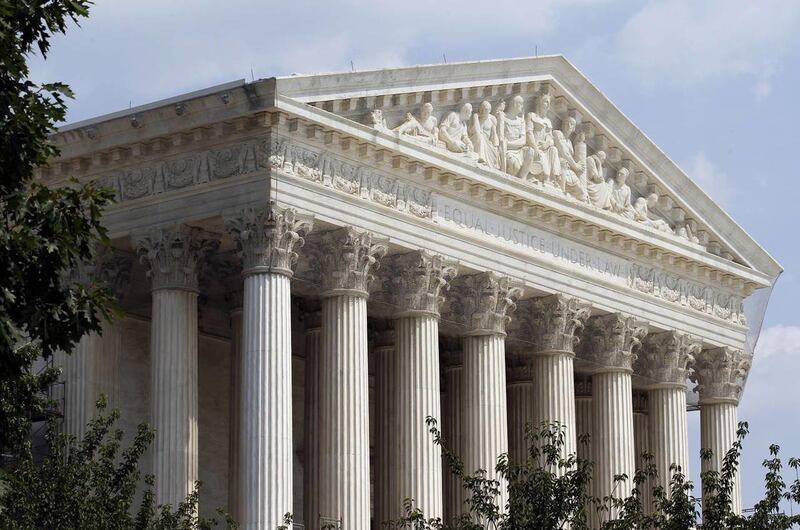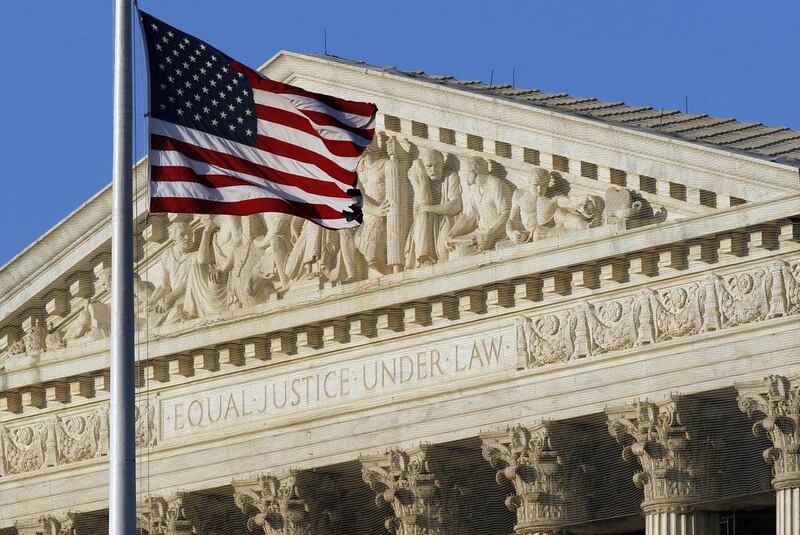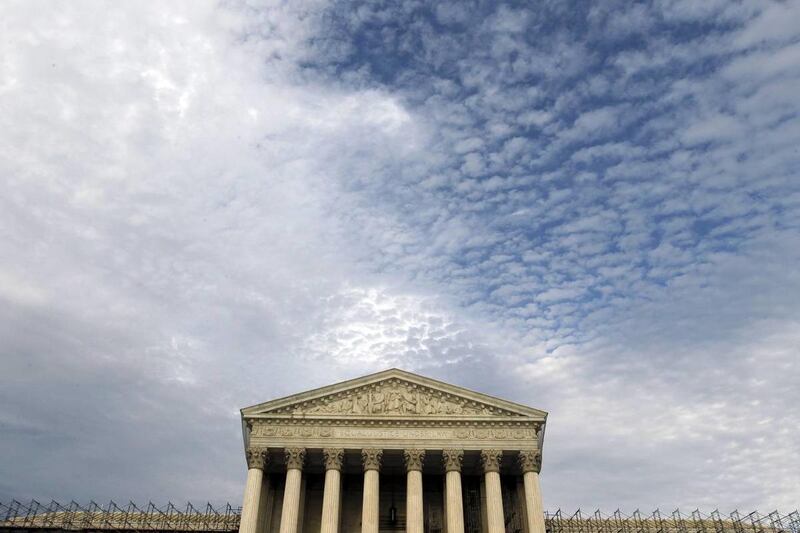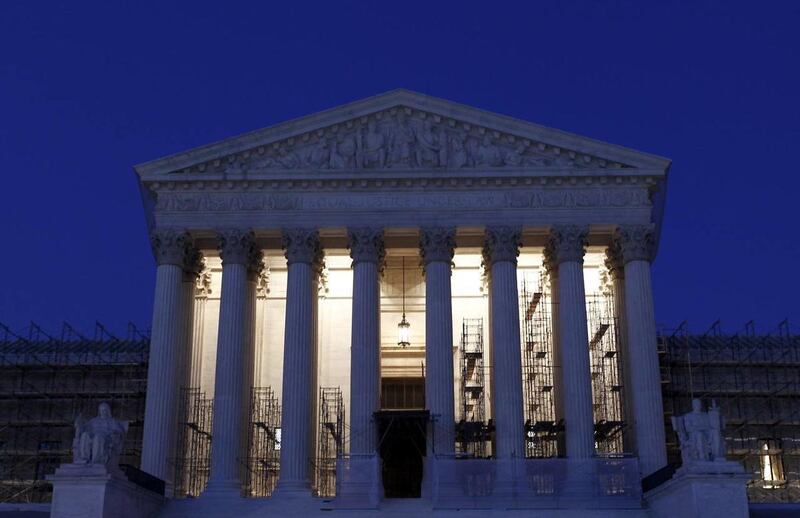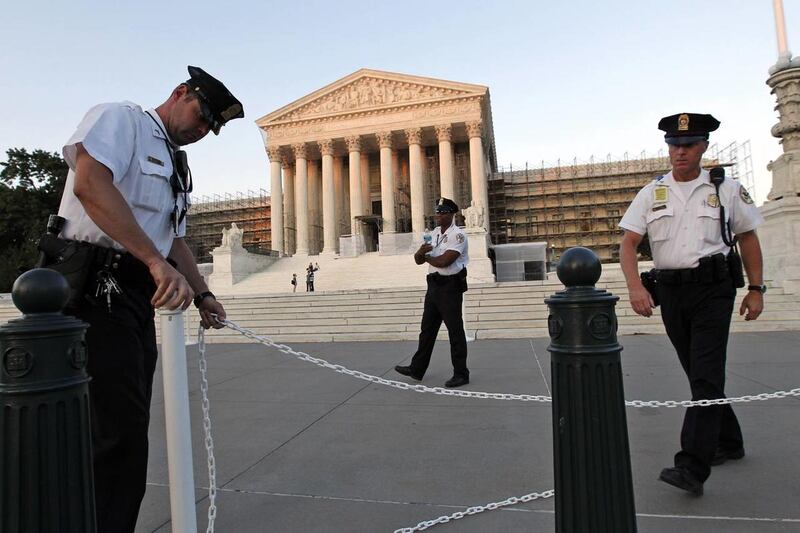In the next two weeks the U.S. Supreme Court will issue decisions on two cases that could fundamentally change what marriage means in the United States.
While no one can be sure what will happen, many experts think the court will strike down the section of the Defense of Marriage Act that defines marriage as between a man and a woman for purposes of federal law.
Most experts also expect the court to avoid making a decision on California's Proposition 8. If the court does sidestep a decision on that case, it will leave in place a lower federal court decision that effectively legalizes gay marriage in California.
But whatever the court decides on both cases, it will not be the final word. The festering conflict between the equality claims of gay marriage advocates and the religious liberty claims of traditionalists seem likely to only intensify.
Down on DOMA
The piece of DOMA at stake defines marriage as between a man and a woman for purposes of federal law, such as taxes and inheritance.
"I think the court will invalidate that section of DOMA, and it may not even be 5-4," said Margaret Russell, a law professor at Santa Clara University in California.
Russell thinks the court will rule that DOMA creates two separate classes of marriage because some states allow gay marriage, leading to unfair treatment from one state to the next.
"If you have legal marriages, then you can't treat them unequally without adequate justification," Russell said, "and there isn't adequate justification."
"I would not be surprised to see DOMA struck down on rational basis alone," agreed Anthony Infanti, a constitutional law professor at the University of Pittsburgh School of Law. "There is as much anti-gay animus in the legislative history of DOMA as there was in the Roemer v. Evans case."
Roemer was the 1996 Supreme Court decision authored by Justice Anthony Kennedy, which struck down a Colorado ballot initiative that would have banned any antidiscrimination laws based on sexual orientation. The Colorado initiative, the court argued, singled out gays with "animus," without offering any minimally plausible rationale.
Liberty v. equality
At the end of this rainbow, alternately hoped for and feared, is a legal and political consensus that puts gender orientation on the same plane as race — forcing any from the public square who disagree.
This prospect has religious conservatives in a quandary. When the United Kingdom’s House of Lords approved legalization of gay marriage this week, the Catholic Church immediately announced that if the law is not amended, it will likely cease to perform civil marriages, in order to avoid inevitable lawsuits.
As the new British law stands, Catholic clergy performing marriages are deemed to be performing a state function, and it would be illegal for them to refuse to perform gay marriages. The Church has appealed for religious liberty exception, but thus far has been rebuffed.
This is the fear that haunts Princeton Prof. Robbie George, himself a Catholic. Speaking in April at Utah's Sutherland Institute, George passionately argued the implications for religious liberty.
“Some think we have lost," he said. "Some people think we should retreat from the fight for marriage and just fight for religious liberty. Folks, I’m here to tell you, if you lose the fight for marriage, there will be no protecting religious liberty.”
Speaking that same night at Utah Valley University, former Utah Gov. Mike Leavitt argued the compromise between the two values must be achieved.
"If through democratic processes our nation recognizes gay marriage and protects sexual orientation as a civil right, it need not and must not do so at the expense of religious freedom," Leavitt said. "Gay marriage and religious freedom should coexist."
Leavitt was less clear on how such a coexistence would be shaped. Presumably, it would parallel efforts in the medical professions to allow dignified "outs" on both sides when doctors or nurses have conscientious objections to abortion or contraception.
Levitt became highly attuned to the conflict between public policy and religious liberty when, as secretary of Health and Human Services in the Bush administration, he had to navigate conscientious objections in the medical profession.
The problem, Leavitt said, is even though the U.S. Constitution guarantees the “free exercise” of religion, differing viewpoints and practices tend to be driven from the public square, just as the Catholic Church in England now finds itself considering leaving the marriage business altogether.
“Free exercise” of religion then becomes “simply and solely the freedom to believe in the quiet of one’s own conscience, as long as the believer does not act on the belief in public,” Leavitt said.
“Under this counterfeit definition of free exercise, expressions of faith — or opinions informed by faith — are unwelcome in the public square,” Leavitt said. “Religion freedom is increasingly replaced by government restrictions. The list of examples has grown rapidly in recent years.”
Still standing?
The deep political, social and religious divides highlighted by Gov. Leavitt and Prof. George are one reason many observers expect the court to use a procedural technicality to avoid making a decision on California's Proposition 8, the controversial ballot measure was approved by voters in 2008, overturning an earlier state Supreme Court decision that legalized gay marriage.
Ducking the issue would keep the Court out of a social and political maelstrom. Most experts think the justices tend to avoid bold actions that would weaken the Court's legitimacy by drawing attention to the Court's unelected character.
A 2010 Federal Court decision overturned Proposition 8, and the state itself has declined to defend the law, leaving its legal defense to an ad hoc group of supporters. One of the key questions the Supreme Court must decide is whether those defending the law have "standing.”
“Standing,” refers to the rules that prevent courts from becoming circuses — by limiting access to those with definable roles in the controversy. While California law does allow supporters of a ballot initiative standing in court, there is some question as to whether that carries over to Federal courts.
The standing question could allow the Supreme Court to avoid deciding on Proposition 8. As a practical matter, that would make gay marriage legal in California, based on the Federal circuit court decision which would be left in place. But this would not affect the other 35 states that currently prohibit gay marriage.
"I think most people are predicting that a majority of the court wants an out,” said Clifford Rosky, a constitutional law professor at the University of Utah law school, and the standing dispute on the California case offers a "plausible out, not an overwhelming one, but a plausible one."
"There is definitely some appetite among some justices for taking that out," Anthony Infanti agreed.
A reluctant court
One reason the Court may be reticent to decide Proposition 8 is that justices are historically very sensitive to the Court’s unelected status, and consequently want to avoid making a sweeping decision overturning laws in the majority of states prohibiting gay marriage.
"Some people could say this is the way the trend is growing, let's just ride the wave," Infanti said, “but others could say, the trend is still early. We are not talking about more than half the states, or three quarters of the states having adopted same-sex marriage."
It's easy to forget, Infanti noted, that the Supreme Court did not decide until 1967 that state laws against interracial marriage were unconstitutional, at a point when relatively few states still had them on the books.
So on the one hand, Justice Kennedy stands as the author of Lawrence v. Texas and Roemer v. Evans — two key Supreme Court decisions overturning state laws on sexual orientation. Lawrence invoked privacy protections to invalidate sodomy laws, while Roemer struck down a Colorado constitutional amendment that would have prohibited antidiscrimination laws protecting gays.
On the other hand, Kennedy is also likely to be reluctant to overturn a sizable majority of state laws in one blow.
Another justice some have eyes on is Justice Ruth Bader Ginsburg, who garnered attention recently when she argued that Roe v. Wade was prematurely decided, went "too far too fast,” and should have been decided on very narrow grounds that only affect of the Texas law in question, rather than imposing a sweeping abortion-on-demand ruling nationwide. This, Ginsburg argued, would have allowed the political consensus to evolve more organically.
While few would expect that either Kennedy or Ginsburg would go so far as to uphold Proposition 8, there is reason to believe that they may be interested in an excuse to avoid deciding it.
One reason the Court may be reluctant to act is that declaring a constitutional right to same-sex marriage would require elevating sexual orientation to "heightened scrutiny" status under the equal protection clause, and the court has been very reluctant since 1977 to create new "classes" of scrutiny, as doing so tends to force the Court into an uncomfortably central policymaking role.
Split the difference?
One possible compromise, Margaret Russell said, would be a decision that strikes down Proposition 8, citing particular “animus” toward gays and lesbians.
Such a decision would rely on the precedent of Roemer v. Evans, which Justice Kennedy argued had singled out gays and lesbians with particular stigma. The animus approach would allow the Court to narrow its decision to California, leaving laws in other states intact.
A slightly broader reach could take aim strictly at states with “civil union” laws, arguing that the distinction between a civil union and marriage is not rational, because the only distinction is the gender of the parties. This would limit the decision’s impact to the handful of states that have already adopted civil union laws, forcing states that have adopted civil unions to allow gay marriage.
But even this might be too broad a reach for Kennedy. "I think that's unlikely because it's a broader decision, and I do not see this court being able to cobble together a majority for a broad decision,” Russell said.
Eric Schulzke writes on national politics for the Deseret News. He can be contacted at eschulzke@desnews.com.

